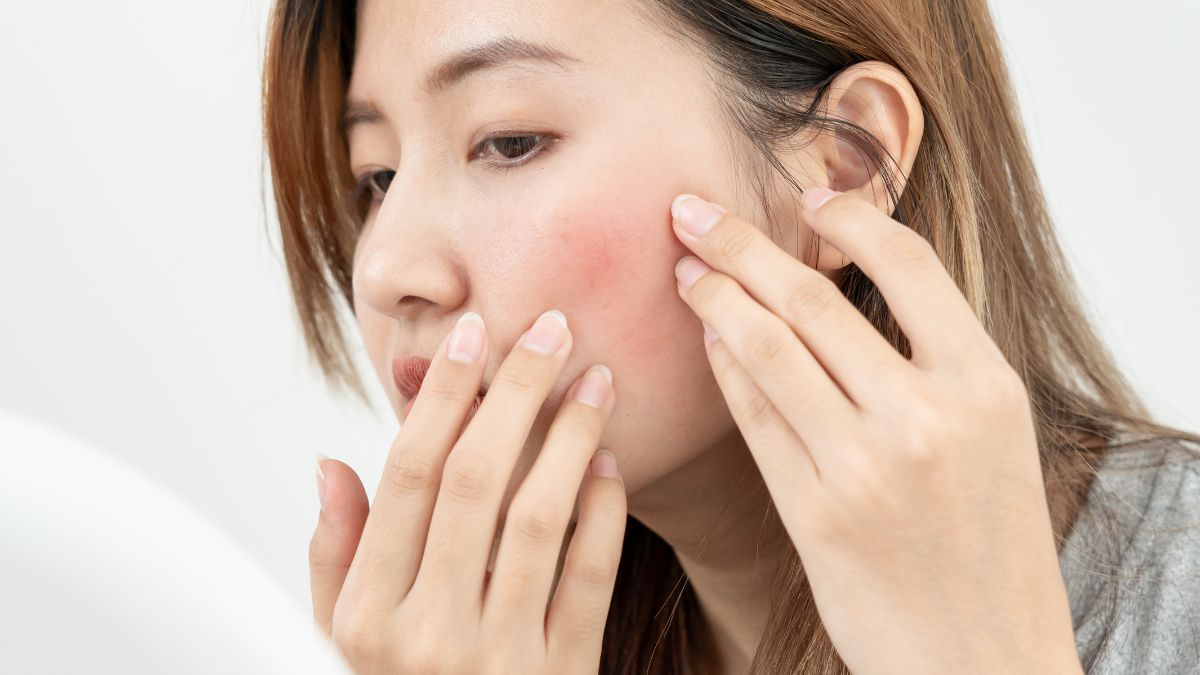Alcoholic Rosacea: Why Do Alcoholics Have Red Faces?
Some people develop a reddening of the skin near their eyes, cheeks, and nose after they’ve been drinking. There are various reasons why this can occur, including a condition called alcoholic rosacea.
If you or a loved one are struggling with alcohol abuse and need a safe place to detox, call us today or verify your insurance online to take the first step toward recovery
What Is Alcoholic Rosacea?
Rosacea is a chronic (long-term) skin condition that is characterized by inflammation, reddening, visible veins, and acne-like bumps, typically on the face. Alcoholic rosacea is a version of this condition that is related to heavy drinking.
A June 2017 study in the Journal of the American Academy of Dermatology reported that increased alcohol intake is associated with “a significantly elevated risk” of rosacea. The researchers also determined that white wine and liquor pose the greatest risk of alcoholic rosacea. This finding contradicts an earlier belief that red wine was a stronger risk factor.
The June 2017 study was based on an analysis of 14 years’ worth of health information from more than 82,000 women who participated in the Nurses’ Health Study II from 1991-2005.
Experts believe that alcoholic rosacea results from a combination of alcohol’s effects, such as:
- Drinking can lead to a dilation (or widening) of blood vessels.
- Alcohol intake can also raise a person’s body temperature.
- People who engage in chronic alcohol abuse are also likely to suffer from dehydration and poor nutrition.
Alcoholic rosacea isn’t the only connection between alcohol and a reddening of the face. Some people experience what experts refer to as alcohol flush reaction, which can include red skin, hives, nausea, and other unpleasant symptoms.
Alcohol flush reaction doesn’t result from alcohol abuse. Instead, it is caused by a genetic variation that impairs the body’s ability to safely process and eliminate alcohol. Even if a person with this genetic variation drinks moderately, they are skill likely to experience alcohol flush reaction.

Does Alcohol Cause Other Skin Problems?
Alcoholic rosacea isn’t the only type of skin damage that can result from drinking too much. Abusing alcohol can also put you at risk for the following:
Dehydration
Alcohol is a diuretic, which means it increases the elimination of water from your body. Continued drinking can cause your skin to become dehydrated, which can give it a gray, wrinkly, and/or washed-out look.
Psoriasis
Psoriasis is a chronic disorder of the immune system that causes red, scaly, and itchy patches on the skin. Alcohol abuse can increase a person’s risk for developing psoriasis, and it can also intensify the symptoms of people who already have it.
Seborrheic Dermatitis
Symptoms of seborrheic dermatitis include oily patches on the skin and flaking that appears similar to dandruff. It most commonly occurs on the scalp, face, or chest. Potential risk factors for seborrheic dermatitis include stress, vitamin deficiencies, and heavy drinking.
Skin Cancer
Medical professionals have long known that alcohol abuse can be a risk factor for several cancers, including esophageal, prostate, breast, and colorectal cancer. Studies also suggest that there may be a link between alcohol and skin cancer.
Jaundice
Alcohol use doesn’t directly cause jaundice, but this condition (which involves a yellowing of the skin and the eyes) can be a sign of alcoholic liver disease.
Alcoholic liver disease occurs in three phases: hepatic steatosis (formerly known as fatty liver), hepatitis, and cirrhosis. Jaundice usually indicates that a person has reached the second or third phase in this progression.
How Can I Avoid Alcohol-Related Skin Damage?
The best way to avoid alcoholic rosacea and other types of alcohol-related skin damage is to avoid alcohol altogether. Of course, while this is a simple solution, it can be extremely difficult for some people.
According to the National Institute on Alcohol Abuse and Alcoholism (NIAAA), research indicates that about 28.9 million Americans ages 12 and above – or about 10% of people in this age range – meet the criteria for alcohol use disorder, which is the clinical term for alcoholism.
If you’re concerned that you may have become addicted to alcohol, ask yourself the following questions:
- Do you often have cravings for alcohol?
- Do you find it difficult or impossible to get through the day without a drink?
- Have you ever missed work or school, or failed to meet other obligations, because of your alcohol use?
- Do you use alcohol in ways that are clearly dangerous, such as by combining it with other drugs?
- Have you continued to drink even after experiencing some type of harm – such as losing your job or being arrested for driving under the influence – as a result of prior alcohol use?
- Do you find that you need to drink more than you used to in order to feel the effects of alcohol?
- Have you ever felt the need to lie about how much or how often you drink?
- Do you frequently drink more than you intended to?
- Has anyone ever suggested to you that you might have a problem with alcohol?
- Do you want to stop drinking, but fear that you can’t?
Answering these questions can’t replace being assessed by a doctor or a qualified addiction expert. But if you’ve responded “yes” to any or all of them, it might be time to schedule an assessment.

Find Alcohol Addiction Treatment in Atlanta
The Retreat of Atlanta is a trusted source of life-affirming care for adults whose lives have been disrupted by addictions to alcohol and other drugs. With our help and a concerted effort on your part, you can end your alcohol use and live a much healthier and more hopeful future.
Programming options at our alcohol addiction treatment center in Atlanta, Georgia, include detoxification and residential rehab. Detox can help you get through alcohol withdrawal safely and with minimized discomfort, while residential rehab can help you build the skills that will support your successful, long-term recovery.
To learn more about how we can help you or a loved one, or to schedule a free assessment, please visit our Admissions page or call us today.